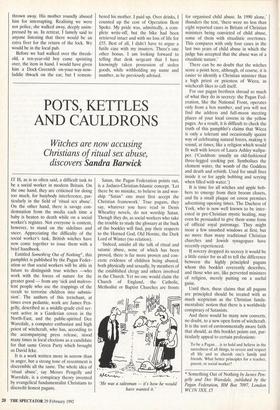POTS, KETTLES AND CAULDRONS
Witches are now accusing Christians of ritual sex abuse,
discovers Sandra Barwick
IT IS, as is so often said, a difficult task to be a social worker in modern Britain. On the one hand, they are criticised for doing too much, for busybody interference, par- ticularly in the field of 'ritual sex abuse'. On the other hand, there is savage con- demnation from the media each time a baby is beaten to death while on a social worker's register. Not everyone is content, however, to stand on the sidelines and sneer. Appreciating the difficulty of the social worker's task, British witches have now come together to issue them with a brief handbook.
Entitled Something Out of Nothing*, this pamphlet is published by the Pagan Feder- ation so that social workers will be able in future to distinguish true witches —who work with the forces of nature for the greater good — from any 'sick and malevo- lent people who use the trappings of the occult to terrorise children into submis- sion'. The authors of this trenchant, at times even pedantic, work are James Pen- gelly, described as a middle-grade civil ser- vant active in a Garderian coven in the North-East, and the public-spirited Dee Waredale, a computer enthusiast and high priest of witchcraft, who has, according to the accompanying press release, stood many times in local elections as a candidate for that same Green Party which brought us David Icke.
It is a work written more in sorrow than in anger, but a strong tone of resentment is discernible all the same. The whole idea of 'ritual abuse', say Messrs Pengelly and Waredale, is a conspiracy theory invented by evangelical fundamentalist Christians to discredit honest pagans. Satan, the Pagan Federation points out, is a Judaeo-Christian-Islamic concept. 'Let there be no mistake, to believe in and wor- ship "Satan" one must first accept the Christian framework.' True pagans, they say, whatever you have read in Denis Wheatley novels, do not worship Satan. Though they do, as social workers who take the trouble to study the glossary at the back of the booklet will find, pay their respects to the Horned God, Old Hornie, the Dark Lord of Winter (no relation).
'Indeed, amidst all the talk of ritual and satanic abuse, none of which has been proved, there is far more proven and con- crete evidence of children being abused, both physically and sexually, by members of the established clergy and others involved in the Church. Yet no one would claim the Church of England, the Catholic, Methodist or Baptist Churches are fronts 'He was a salesman — it's how he would have wanted it.' for organised child abuse. In 1990 alone,' thunders the text, 'there were no less than eight reported cases in Britain of Christian ministers being convicted of child abuse, some of them with ritualistic overtones. This compares with only four cases in the last two years of child abuse in which the judge has accepted that the abuse was of a ritualistic nature.'
There can be no doubt that the witches score a point here, although, of course, it is easier to identify a Christian minister than a high priest or priestess of Wicca, as witchcraft likes to call itself.
For our pagan brethren shroud so much of what they do in secrecy: the Pagan Fed- eration, like the National Front, operates only from a box number, and you will not find the address and full-moon meeting places of your local covens in the yellow pages. As a result, it is difficult to check the truth of this pamphlet's claims that Wicca is only a tolerant and occasionally quaint way of celebrating natural forces, making it sound, at times, like a religion which would fit well with lovers of Laura Ashley wallpa- per. ('Cauldron: usually an old-fashioned three-legged cooking pot. Symbolises the element water, the womb of the Goddess and death and rebirth. Used for small fires inside it or for apple bobbing and scrying when filled with water.') It is time for all witches and apple bob- bers to emerge from their broom closets, and fix a small plaque on coven premises advertising opening times. The Duchess of York, who is now well known to be inter- ested in pre-Christian mystic healing, may even be persuaded to give them some form of official royal patronage. They might incur a few smashed windows at first, but no more than many traditional Christian churches and Jewish synagogues have recently experienced.
If sorcery dropped its secrecy it would be a little easier for us all to tell the difference between the highly principled pagans whom this booklet reverently describes, and those who are, like perverted ministers of religion, merely putting on a useful guise.
Until then, these claims that all pagans are principled should be treated with as much scepticism as the Christian funda- mentalists' notion that there is a worldwide conspiracy of Satanists.
And there would be many new converts, no doubt, to a new open form of witchcraft.
It is the sort of environmentally aware faith that should, as this booklet points out, par- ticularly appeal to certain professions:
To be a Pagan ...is to hold and believe in the sacredness of all things, to revere and respect all life and to cherish one's family and friends. What better principles for a teachcr, parent, or social worker?
* Something Out of Nothing by James Pen- gelly and Dee Waredale, published by the Pagan Federation, BM Box 7097, London WC1N 3XX, £5


















































 Previous page
Previous page